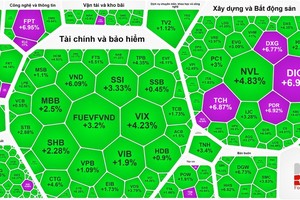At the recent meeting of the National Assembly Standing Committee, a delegate raised the issue of management for e-commerce activities, saying that e-commerce is a trend and has developed rapidly. Many people have been using e-commerce to trade in contraband, prohibited goods, and tax evasion.
In response to the question, Minister Ho Duc Phoc revealed that the finance sector has collected $ 219,385,102 from businesses on the internet. Moreover, the minister cited that in the past year, many large enterprises have paid taxes such as Facebook having paid VND1,694 billion, Google with VND1,618 billion, Microsoft VND576 billion, and tax collection from cross-border e-commerce reached VND1,317.7 billion
This is the first time that the Vietnamese tax authority has publicly disclosed the tax collection figures for transnational technology corporations and e-commerce transactions on their platforms. In the years 2017 - 2018, this issue of revenue collection of e-commerce transactions was raised causing a lot of controversial debates.
In this era of science and technology with the 4.0 technology revolution, along with the convenience of the internet system, this is the foundation for the development of e-commerce which is expanding in all countries.
In the Southeast Asian country, although e-commerce is a relatively new field, it has developed rapidly, especially during the outbreak of the Covid-19 epidemic when e-commerce transactions accounted for about 60 percent of commercial activities, transactions according to the Ministry of Industry and Trade's data.
Nevertheless, because it is a new type, e-commerce in Vietnam also reveals many shortcomings, especially in state management. Currently, Vietnam has been suffering the loss of tax revenue on existing e-commerce platforms including cross-border e-commerce and domestic e-commerce.
Tax evaders who do business in cyberspace often find loopholes in the present regulations to avoid paying taxes by using many different accounts for business, leading to inaccurate tax declarations and very difficult to obtain revealing many inadequacies in management.
Many social networking sites in foreign countries don’t have a legal entity to manage in Vietnam, so it is very difficult to manage. In fact, this is an act of tax evasion.
In addition, there has been a big change in the structure of Vietnam's budget revenue in the current period. The proportion of revenue from import and export taxes has decreased a lot, partly because Vietnam has signed many free trade agreements, including many tax incentives while other sources of revenue in the domestic market have decreased significantly.
The southern metropolis is also facing many difficulties due to the impact of the Covid-19 epidemic not to mention the increased disparity between revenue and expenditure in the fiscal balance of the budget, partly because the Government is having to offer unprecedented stimulus packages and economic recovery In that context, tax collected from e-commerce will be an important source of revenue to make up for the shortfall in the budget.
Recently, the General Department of Taxation also launched the electronic portal Etaxvn.gdt.gov.vn for foreign suppliers and the eTax Mobile application. Foreign suppliers can register, declare and pay tax as well as look up information through the portal as well as learn about the tax legal system and related legal policies on tax law and e-commerce in Vietnam.
However, this is also an effective tool for tax authorities to control revenue from e-commerce transactions including cross-border transactions. On the other hand, this also helps e-commerce between individuals and businesses more transparent and equal.
























